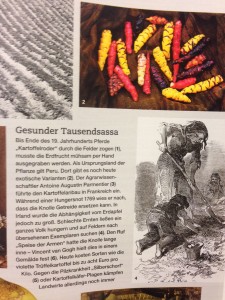 Let’s be fair. The inability to distinguish the potato from other Andean roots and tubers is not entirely confined to National Geographic. Take, for example, the November 2013 edition of the German magazine P.M. History. I don’t think it is online, but there’s an article in there entitled “Eine kleine Knolle verändert die Welt,” or “A small tuber that changed the world.” The first couple of pages are reproduced here. Clearly, it’s about the potato.
Let’s be fair. The inability to distinguish the potato from other Andean roots and tubers is not entirely confined to National Geographic. Take, for example, the November 2013 edition of the German magazine P.M. History. I don’t think it is online, but there’s an article in there entitled “Eine kleine Knolle verändert die Welt,” or “A small tuber that changed the world.” The first couple of pages are reproduced here. Clearly, it’s about the potato.
 Ah, but wait, for a little further on one comes across a photo of what are clearly not potatoes. Unless of course all is explained in the caption, but somehow I doubt it.
Ah, but wait, for a little further on one comes across a photo of what are clearly not potatoes. Unless of course all is explained in the caption, but somehow I doubt it.
The confusion goes back even further. After all the “potato” seems to have borrowed its name from Ipomea batatas, the sweet potato, the real batatas. So how appropriate that its name be confused with other tuberous Andean plants.
The caption does indeed say to the effect that ‘the place of origin of the potato is Peru, where today you can still find exotic varieties’.
What are they in fact?
They look like oca, Oxalis tuberosa, and this is a long-standing sore point for us and others.
LOL, yes, I remember reading many years ago that this vegetable supposedly has some unfortunate side-effects in males, so I wrote to a certain person who was distributing it in the UK and asked him whether this was correct, or not. I was somewhat aghast when he, bizarrely, wrote back saying that he didn’t care whether it would have that effect on his unsuspecting customers, as maybe then they would have fewer children!
Totally missing the point that the postulated effects might be very distressing on the men and their partners, taken unaware, and that these days we have a marvellous invention for preventing reproduction – it’s called contraception.
So to this day I still don’t know if it’s true.
I’d certainly be a bit cautious about eating something that’s an Oxalis, given the toxicity of oxalates.
It seems to be extremely hard to get decent information on the safety of ‘under-utilised’ crops.
Hi between the lines,
The Andean tuber that has an effect on testosterone is not oca, Oxalis tuberosa, but another Andean tuber that looks even more like oca than potatoes do: Tropaeolum tuberosum, which has several common names in different parts of the Andes, such as mashua, añu, and isañu. Timothy Johns did some studies over 30 years ago that confirmed that rats fed mashua tubers did indeed have lower testosterone levels (but could still impregnate females). Perhaps for that reason, some folks claim that Tropaeolum tuberosum may an effective treatment against prostate problems, but I haven’t looked into whether that has been validated.
The traditional ways of treating oca tubers before cooking reduce the levels of oxalic acid, although most kinds of oca don’t have dangerous levels of oxalate (lower than spinach, for sure, and also lower than some kinds of potato).
Hi Eve, many thanks for your kind response. After 20 or so years my memory of the incident may well have gone a bit hazy, or maybe the information I’d found back then was a bit off. When it comes to ‘alternative’ foods misinformation often seems to abound – and we didn’t have the internet then!
Now it is a matter of seconds to uncover the information that ‘The Spanish chronicler Cobo stated that the Inca emperors fed their armies mashua, “that they should forget their wives” ‘ in Travis Clark’s leaflet devoted to Mashua, available online.
My feeling on the subject remains the same; as a matter of common fairness and responsibility, not to mention due diligence, anybody selling foods to people in countries where they are little known and understood, should warn people of their potential problems. It’s not difficult, a simple line of advice in the catalogue should suffice.
Anyway thanks again for that, Eve.
I’m not sure that we know enough to give mashua consumers any definitive guidance. We have a couple of small studies feeding rats large amounts of mashua (like 1g/kg of extract). That may not sound like much, but mashua is about 80% water, so we’re talking about 350g of mashua per day for a 70kg man. If you’ve never tasted mashua, let me assure you that is a lot. Plus, rat models are really the base level of study; with no clinical experiments, nobody really knows what effect mashua has on humans.
We do know that a lot of Andean farmers ate mashua for generations and seemed to be able to produce replacement population, so if there is an effect, it is probably not particularly strong. Out of curiosity, I ate as much mashua as I could stand (although certainly not as much as 5g/kg wet) for two weeks this year and suffered no noticeable effects, other than that strange aftertaste.